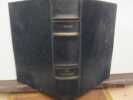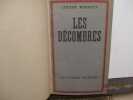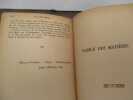23 books for « prison »Edit
-
Type
Book (22)
Old papers (1)
-
Century
19th (1)
20th (3)
-
Countries
Belgium (1)
Canada (1)
France (20)
Switzerland (1)
-
Syndicate
ILAB (7)
SLAM (6)
Topics
- Administration (1)
- Alsace (1)
- Anonymous (1)
- Autographs (1)
- Bastille (2)
- Bibliophilism (1)
- Convict prison (1)
- Death (2)
- Ethnology (1)
- First edition (2)
- Fontevraud (1)
- French action (1)
- History (2)
- Institutions (1)
- Justice (1)
- Law (1)
- Liberation (2)
- Literature (1)
- Manuscripts (1)
- Military arts (1)
- Paris (1)
- Policy (1)
- Prisons (1)
- Romania (1)
[Samuel Hoare] [Society for the Improvement of Prison Discipline, and for the Reformation of Juvenile Offenders.]
Reference : AMO-2714
(1820)
Rules proposed for the government of gaols, houses of correction, and penitentiaries. Compiled from various acts of parliament for the regulation of prison, and selected from rules in force at the best conducted gaols in Europe : to which are added, plans of prisons on improved principles ; and a description, with plates, of A Corn Mill and Water Mill, adapted for the employment of prisoners. Published by the Society for the Improvement of Prison Discipline, and for the Reformation of Juvenile Offenders.
London, Printed by T. Bensley, 1820 1 vol. in-8 (23 x 14 cm) de VI-(1)-65 pages. 10 planches hors-texte (la plupart dépliantes). Voir le détail des sujets ci-après. Cartonnage de l'époque plein papier gris, relié sur brochure, non rogné, étiquette de titre imprimée au dos (d'origine). 1 planche détachée. Quelques rousseurs et feuillets jaunis, néanmoins excellent papier de qualité (papier vélin de cuve). légères usures au cartonnage néanmoins solide. First edition. "The society for the improvement of Prison Discipline, in submitting to the public the following suggestions respecting the proper regulations to be adopted in Prisons, deem it superfluous to detain their readers by endeavouring to prouve what is already obvious, that the judicious mangement of Gaols is a subject of the utmost importance. An intention has been imputed to this society, than which nothing can be more foreign from its real purpose, that of making the interior of a prison a more desirable residence than the habitations of the poor ; the motives which actuate the members of the society are allowed to be benevolent, but the consequences of carrying their views of reform or improvement into effect, are supposed by some persons to be mischievous ; it is presumed that offenders are intimidated, by the miseries and privations they have experienced or anticipate ; if prisons, it is said, are rendered places of comfort, where food and lodging are gratuitously provided, they become incentives to crime and a recompence for its commission. In this view of the subject, however, the society cannot coincide : it is true, they consider it desirable that prisons should be clean, and the food given to the prisoners, plain, wholesome, and sufficient ; but they are equally anxious that everything which borders on sensual gratification or unnecessary comfort should be entirely prohibited. They are of opinion that the punishment contemplated by the law should alone be inflicted, and that no collateral evils, the horrors of disease, and the corruption of principle, should be superadded ; but they are decidedly adverse to any permission of idleness, dissolute behaviour, or to any indulgencies, excepting those conferred as the reward of good conduct ; they are desirous that constant and imperative labour should occupy the prisoners, and prepare their minds for such instruction as may eradicate evil habits, and substitute good dispositions: a prison thus regulated offers no attraction to the vicious, and the society confidently appeal to the evidence of facts as confirming the deductions of reason, wherever this experiment has been fairly tried. It must be apparent to all who have directed their attention to this subject, that the system of Prison Discipline too. generally prevalent in England was confined to a single object, the safe custody of the prisoner ; and to one method of accomplishing that object, severe and sometimes unnecessary coercion : if the prisoner could be retained within the walls of a gaol by bars, by chains, or by subterraneous and unventilated dungeons, by the use of any rigour or privation ; this plan, aiming only at his personal security, was deemed sufficient: the possibility of reforming the criminal seems never to have been contemplated ; no rule was in force, no arrangement existed which could be referred to such a purpose: the attempt to disengage the culprit from long formed habits of vice, and to rekindle in his breast the latent sparks of virtue, were schemes known indeed by the writings of Howard, but generally regarded as the visionary efforts of an excessive philanthropy. Such has been the progress of public opinion, that it is not now requisite to dwell upon the expediency of making these attempts, or to contend against a system calculated to multiply offences, and to ripen indiscretion into crime; a new plan has been gradually developed, in which moral restraint removes the necessity of brutal violence ; in which the prisoner is justly considered as possessing rights which we must not v violate, and feelings which we must not wound, beyond what the sentence of the law demands: a system equally opposed to that dangerous indulgence which permits scenes of vice, drunkenness, or debauchery to be exhibited ; and to that useless cruelty, which, producing no beneficial effect in the way of example, tends to harden the character of those who are subjected to its operation ; a system, in short, which suppresses for a time at least many evil habits, and substitutes those of industry, decency, sobriety, and order. The strong interest taken by the public in this momentous question, the examples which have been adduced of the successful application of these principles to practice ; the zeal manifested by the magistrates in general throughout the country, and the appointment of committees in both houses of Parliament, furnish a well-grounded confidence that the improved system of Prison Discipline will now be fairly and fully tried. The society for the improvement of Prison Discipline have received so many applications for information respecting numerous particulars, that they apprehend they cannot more effectually consult the wishes or convenience of the public, than by an endeavour to collect and arrange those recommendations which the result of reflection and experience enables them to offer. Much consideration has been bestowed upon the plans which accompany this tract, and great assistance has been derived from the architectural skill of Mr. Ainslie, and Mr. Bullar, in the arrangement and illustration of these designs: these gentlemen have gratuitously afforded the Society most valuable aid, for which the Committee beg to express their sincere acknowledgments ; the object in view was to give such plans, as might best combine the advantages of inspection and classification, leaving it to the discretion of different districts to accommodate the same to their own local circumstances. With regard to the rules which are suggested, there is no pretension to originality ; the first aim of the society has been to obtain an accurate acquaintance with the actual management of the best regulated gaols ; to compare attentively the course pursued in each, with their practical consequences ; and then to select and combine, under one arrangement, those rules which appeared upon the whole most judicious and effective. The importance of providing employment for prisoners, and the difficulty of procuring it, have deeply engaged the attention of the society, but hitherto without enabling them to arrive at any conclusion which is universally applicable ; but there is one species of labour obtained by the introduction of mills, and especially of stepping mills, which may furnish constant occupation to a determinate proportion of the prisoners. The advantages derived from the use of mills in several prisons, have been very conspicuous, not so much perhaps in a pecuniary point of view, as in the moral benefits resulting to the prisoner. A stepping mill of a superior description, and which the Committee cannot too earnestly recommend for the employment of prisoners, has been lately constructed, on very ingenious principles, by Mr. Cubitt, Civil Engineer, of Ipswich. To the liberality and kind attention of this gentleman, the Committee are indebted for the annexed illustrations of the machinery, and explanation of its power and effects. . Should the recommendations here collected, be found useful in assisting those gentlemen, who unite the power with the inclination to promote the grand and progressive work of improvement in Prison Discipline, the object of the society will be fully attained. (Preface, London, 1st January, 1820, Samuel Hoare, Jun., Chairman of the Committee). Samuel Hoare Jr (9 August 1751 – 14 July 1825), chairman of the committee was a wealthy British Quaker banker and abolitionist born in Stoke Newington, then to the north of London. His London seat was Heath House on Hampstead Heath. He was one of the twelve founding members of the Society for the Abolition of the Slave Trade. The engravings are : 1. Plan of a County Gaols for 400 prisoners. Designed by George Ainslie. 2. Plan of a Gaol for on hundred and twenty prisoners. G.T. Bullar architect. 3. Plan of the Chapel and sleeping cells. 4. Plan of a house of correction for sixty prisoners. G.T. Bullar architect. 5. House of correction for twenty eight prisoners. G.T. Bullar architect. 6. Ground Plan of a design for a Prison Corn Mill. 7. Crofs section of design for Prison Mill shewing the elevation of Machinery. 8. Crofts sectiloln of design for Prison Mill, shewing the elevation of the tread wheels and method of working. 9. Longitudinal section of design for Prison Mill, shewing elevation of Machinery. 10. Plan and section for a Pump Mill. (complete). Very rare.
Phone number : 06 79 90 96 36
[Prison, For-l'Évêque, Paris] Intéressante pétition des prisonniers de la « Bastille des comédiens ».
Reference : 015169
[Prison, For-l'Évêque, Paris] Intéressante pétition des prisonniers de la « Bastille des comédiens ».
[Prison, For-l'Évêque, Paris] Intéressante pétition des prisonniers de la « Bastille des comédiens ». P.S., Paris, 2 septembre 1774, 2p in-folio. Longue et intéressante supplique de prisonniers, se présentant comme d'honnêtes gens mis en prison à cause de leurs dettes et de l'édit de 1773 à un contrôleur général pour se plaindre de l'expulsion du concierge, Dinant du Verger, remplacé par un « homme ambitieux », le greffier Gurlier. Cette pétition est signée par 28 prisonniers dont aucun ne semble être connu : Carvalho (capitaine de cavalerie), Debar, Beaufils de . (de Saint Flour), Mendes Duplessis, Lameynardie, Doumain(?) de Beauchamp, Reynaud, Du Fossé, B.H. Wallop (gentilhomme anglais), Du Fresne, Desmaisons, De Lagarenne, Bouchery, Bascaud du Sablon, Cretté, Bénézet, Cordelle, Le Foullon Duplessis, etc. La liste des personnalités emprisonnés dans cette prison est longue : Giacomo Casanova (1759), Fréron (1760), La Harpe (1760), La Clairon et autres comédiens de la Comédie-Française (1765), Sophie Arnould (1769), Sade (1771) ou Beaumarchais (1773). Belle pièce. [372]
Lettre autographe signée, datée de Troye, le 12 novembre 1951, adressée à Henri MASSIS. 12 pages (6 feuillets recto-verso), in-4 (21,7 x 17 cm), écrites à l'encre noire sur papier à petits carreaux détachés d'un cahier d'écolier.
En août 1951 Maurras est transféré de la prison de Clairvaux à l'Hôtel Dieu de Troye en raison de son état de santé. C'est de là qu'il écrit à Henri Massis à propos du livre "Maurras et notre temps" qu'il vient de faire paraître. Maurras lui adresse son immense gratitude, mais lui demande aussi des précisions sur les phrases ou expressions qu'il ne se souvient pas d'avoir employées ; il souligne le bien fondé de telle ou telle mise en lumière d'épisode politique et évoque quelques souvenirs personnels. Il termine par ces mots : "Que nous aurions de choses à nous dire, mon cher ami ! D'ouvertures mutuelles à nous donner ! Cette jeune génération que j'ai à peine entrevue et que vous avez suivie, que vous pressez encore de la pointe du fer sacré, vous m'en feriez une seconde révélation, à laquelle ma vieille tête aimerait rêver longtemps prise entre les meminisse juvabit et des vues d'avenir qui sortent d'elles-mêmes, toutes nues ou long voilées, des plages perdues du passé ! Enfin ce sera peut-être pour bientôt. Soit que les portes s'ouvrent, soit que vous les perciez de votre fer de lance, je vous dis de toute façon à bientôt, au milieu de tous les mercis explosifs et inarticulés qui ont dû échapper de ce papier dès que vous l'avez ouvert" Il signe "Charles Maurras, Vieillard de Troie". Cette lettre a paru dans l'ouvrage réalisé également par Henri Massis : "Lettres de prison", sélection de lettres rédigées entre le 8 septembre 1944 et le 16 novembre 1952, et publiée par Gallimard en 1958 (pages 194-196, dont nous donnons la copie).
Pièce signée
[Prison, Fontevraud] Feuille de sortie. P.S., 5 & 10 juillet 1825, 1p in-folio. Feuille de sortie de Françoise Marnais, 34 ans, native de Vouzé (?), arrondissement de Ruffec, Charente, et domiciliée à Saint-sauvant (Deux-Sèvres selon le papier mais Vienne en réalité). Elle avait été condamnée à 1 an et 1 mois de prison pour un vol de souliers et avait purgé entièrement sa peine. Le document est signé par le greffier, le maire de Fontevraud (Roy ?) et, le 10 juillet, par un gendarme de Lusignan. Beau document. [372]
Description d'un moulin de discipline appelé tread mill, inventé en Angleterre, par M. Cubitt, d'Ispwich, Comté de Suffolk...
Londres, Imprimerie de T. Bensley, Longman, Hurst, Rees, Orme, & Brown, 1822. 1 plaquette in-8. 10pp, 6 pl. Broché, couverture rose imprimée.
"Pour servir d'occupation aux prisonniers, et recommandé, sous ce rapport, par la société établie à Londres sous le titre de société ayant pour objet l'amélioration de la discipline intérieure des prisons et la réformations des jeunes criminels". Traduit de l'anglais et publié par ordre du Comité. Cet usage est recommandé par une société établie à Londres qui s’intitule « Société ayant pour objet l’amélioration de la discipline, parmi toutes sortes d’instruments, pour faire sentir aux prisonniers la stérile et monotone fatigue d’un travail purement mécanique et systématiquement improductif ». Le moulin à discipline était ainsi un instrument de torture destiné à mater les prisonniers en les épuisant physiquement et mentalement.Illustré de six planches dont quatre dépliantes. "Le travail de chaque individu consiste, simplement, à monter un nombre indéfini de degrés, et le poids combiné des prisonniers, produit sur la roue, précisément le même effet que l'eau d'une rivière agissant sur les aubes d'un moulin à aubes". "Dans diverses parties du royaume, on a éprouvé le plus grand embarras pour trouver une occupation convenable et régulière applicable aux prisonniers condamnés aux travaux forcés. Cette difficulté, ces embarras, n'existent plus, grâce à l'invention du moulin de discipline, et nous avons la ferme espérance que, lorsque les avantages de cette invention seront mieux appréciés, l'usage de ce moulin deviendra universel dans les maisons de correction".Dès 1818, les Britanniques équipent de cette machine leurs plus grandes prisons, au pays ou dans leurs colonies. Les Américains les imitent en installant leur premier moulin dans une prison de New York en 1822. Le moulin de discipline restera en usage jusqu’en 1870.RIBOT, Alexandre, « le système pénitentiaire en Angleterre », Revue des Deux mondes T 103, 1873.
Discours prononcé par M. le Lieutenant civil à la séance du 26 mai 1790.
Paris, Chez Baudouin, 1790 in-8, 4 pp., dérelié.
Réfutation des bruits mettant en cause le Maire de Paris sur le mauvais fonctionnement du Châtelet : coupables non jugés, prisonniers relâchés, etc. La prison du Châtelet est engorgée par un grand nombre d'accusés qui autrefois étaient jugés par la police. - - VENTE PAR CORRESPONDANCE UNIQUEMENT
Bronze medal - Prison de Verviers.
".: 3. Original bronze medal, diameter 60 mm. On recto side ; a view of the prison of Verviers. On verso side ; the groundfloor of the building, with the construction dates (1890-1893). Slight oxidation."
Mémoires de la Bastille sous les Règnes de Louis XIV, Louis XV et Louis XVI
A Londres, 1784 ; in-12, bas marbrée, encadrements de filets dorés, dos orné, tranches marbrées (Reliure de l'époque) "322 pp. Livre extrêmement rare, inconnu de Barbier, non mentionné dans Quérard parmi les critiques de Linguet, inconnu aussi de Le Clère. L'exemplaire qui se trouve à la Bibliothèque Nationale sous la cote LK7 13989 ne fournit aucun renseignement sur l'auteur. Violente critique du régime français: "" Depuis que la liberté des François a reçu, pour ainsi dire, le coup de la mort, sous les dernières années du règne de Louis XV, le despotisme, ce fléau du genre humain, semble s'être affermi en frappant sur tous les ordres et en rendant la terreur générale. L'espionnage et la délation, moyens presque toujours sûrs de parvenir de parvenir, ont jeté la défiance et l'aliénation dans la plupart des esprits. Le philosophe se tait, ou s'exile même, et le peuple courbé sous le poids de sa chaîne, acquiert peu à peu une froide insensibilité, qui lui ôte bientôt tout ce que la nature peut avoir donné d'énergie à l'espèce humaine"". La violence de ton qui domine dans toute l'introduction est véritablement pré-révolutionnaire.- La Bastille est symbole de toutes les scélératesses commises sous le sceau de l'autorité publique. L'ouvrage de Linguet est fortement critiqué. Précieux exemplaire avec l'ex-libris-étiquette du Comte d'Artois, futur Charles X."
Ecrivains en prison. Recueil conçu comme un voyage à travers l'expérience carcérale. ... contient des détails biographiques de chaque prisonnier d'opinion (49 écrivains).
Labor et Fides 1997. Bel exemplaire broché, in-8, 253 pages + liste des auteurs.
Bénie sois-tu prison.
Paris, Plon, s.d.; in-8, br. Broché exemplaire écorné etat correct.
Broché exemplaire écorné etat correct.
Lucien Rebatet, Moras-en-Valloire,15 novembre 1903, 24 août 1972, Ecrivain, journaliste, Critique musical et cinématographique. En 1942, il publie Les Décombres, féroce pamphlet antisémite. Condamné à mort à la Libération, puis gracié, il reste en prison jusqu'en 1952 . Il abandonne alors la polémique, se consacrant à la critique cinématographique et à sa carrière d'écrivain.
Reference : 48108
(1942)
Les Décombres de Lucien Rebatet.
1942 PARIS, Ed. Denoël - 1942 - Edition Originale - In-8 - Reliure maroquin - couverture conservée - Ed. orig. sur papier courant, il n'a été tiré que 50 exemplaires sur vergé - 669 pages - Bel exemplaire - joint Article de la Libération du 25/03/1993 - Réf. 48108
- Livraison a domicile (La Poste) ou sur simple demande en Mondial Relay.- ATTENTION: Colis recommandé uniquement sur demande (parcel recommended on request). Si vous désirez un remboursement équivalent au montant de votre achat, en cas de perte détérioration ou spoliation, demandez-nous expressément un envoi en recommandé ( if you wish a repayment equivalent to the amount of your purchase, in case of loss - deterioration or despoliation, ask us expressly for a sending recommended)- Conditions de vente : Les frais de port sont affichés à titre Indicatifs (pour un livre) Nous pouvons être amené à vous contacter pour vous signaler le surcoût du au nopmbre de livres achetés ou du poids de ceux-ci. - Conditions of sale : The shipping costs are displayed as an indication (for one book) We may need to contact you to inform you of the cost of the additional shipping depending on the weight and the number of books- Possibilité d'envoi par Mondial-Relay - Réception en boutique sur rendez-vous. Librairie G. PORCHEROT - SP.Rance - 0681233148
Lucien Rebatet, Moras-en-Valloire,15 novembre 1903, 24 août 1972, Ecrivain, journaliste, Critique musical et cinématographique. En 1942, il publie Les Décombres, féroce pamphlet antisémite. Condamné à mort à la Libération, puis gracié, il reste en prison jusqu'en 1952 . Il abandonne alors la polémique, se consacrant à la critique cinématographique et à sa carrière d'écrivain.
Reference : 48827
Les Décombres de Lucien Rebatet
PARIS, Ed. Denoël - 1942 - In-8, 12 x 19 cm - Broché - Ed. orig. sur papier courant, il n'a été tiré que 50 pur fil en grands papiers - Ce 1er tirage comptant 4 parties, le second en comptant 6 - 669 pages - Bel exemplaire - Réf.48827
- Livraison a domicile (La Poste) ou sur simple demande en Mondial Relay.- ATTENTION: Colis recommandé uniquement sur demande (parcel recommended on request). Si vous désirez un remboursement équivalent au montant de votre achat, en cas de perte détérioration ou spoliation, demandez-nous expressément un envoi en recommandé ( if you wish a repayment equivalent to the amount of your purchase, in case of loss - deterioration or despoliation, ask us expressly for a sending recommended)- Conditions de vente : Les frais de port sont affichés à titre Indicatifs (pour un livre) Nous pouvons être amené à vous contacter pour vous signaler le surcoût du au nopmbre de livres achetés ou du poids de ceux-ci. - Conditions of sale : The shipping costs are displayed as an indication (for one book) We may need to contact you to inform you of the cost of the additional shipping depending on the weight and the number of books- Possibilité d'envoi par Mondial-Relay - Réception en boutique sur rendez-vous. Librairie G. PORCHEROT - SP.Rance - 0681233148
ILLUSIONS DISSIPEES ou COMMENT ON PERD LA FOI.
ROULERS - IMP. L. ACKERMAN ET CIE. 1908. In-16. Broché. Bon état, Tâchée, Dos satisfaisant, Intérieur frais. 89 pages - Tampon sur la page de titre - Rousseurs sur le 1er plat.. . . . Classification Dewey : 320-Science politique
Classification Dewey : 320-Science politique
Les Souvenirs d’un jeune prisonnier ou Mémoires sur les prisons de la Force et Duplessis, pour servir à l’histoire de la Révolution.
Paris, Mathé, an III (1795). In 8 broché de 88 pp., couverture factice.
Non cité par Tourneux.
Lettre de M.G.D. alors détenu dans la maison des Carmes, adressée à son épouse.
Sans lieu ni date (1794). In 8 de 23 pp., couverture factice.
****
Rapport fait à la Convention Nationale, sur l’affreux régime des prisons du Luxembourg et des Carmes et les cruautés exercées sur les patriotes par les ordres de Maximilien, dernier tyran des français. Seconde édition.
Paris, Toubon, an II (1794). In 8 de 16 pp., couverture factice.
****
Martin-Bernard, Martin Bernard dit (1808-1883), ouvrier typographe et député de la Loire, révolutionnaire républicain, en prison de 1839 à 1848.
Reference : 000352
Lettre autographe signée à César Bertholon
L.A.S., Paris, mars 1872, 2p In-8 (35 lignes environ). Il écrit à César Bertholon qui lui a demandé son adhésion pour la création du journal Le Républicain de la Loire, ce qui l'enchante. Il aurait « vivement regretté » qu'on le lui demande pas son adhésion. Autographe peu courant, autour de la création de ce journal, dont le premier numéro paraître le 1er avril 1873 et connaîtra plus de 5000 numéros
Comme si tu pissais dans un violon.
Paris, Solar hors série, 1971; in-8, 403 pp., br. Broché bon état - Les patronages - La vingt et une - Eysses - La mutinerie de la Santé - Sainte-Anne - La liberté.
Broché bon état - Les patronages - La vingt et une - Eysses - La mutinerie de la Santé - Sainte-Anne - La liberté.
et autres pamphlets - Texte établi sur les éditions originales - Introduction
et notes par Robert Casanova,Paris, Jean-Jacques Pauvert Coll. 'Libertés 52' 1967, 181 pp., 1 vol. in 12 oblong br.
LAFORCE, François-Xavier, patriote du Bas-Canada, signataire, le 12 octobre 1837, d’une Invitation patriote à Richelieu. Syndic, maître de poste, marchand et maître chantre de l’église de St-Denis-sur-Richelieu de 1829 à 1840. Décédé à St-Hyacinthe après avoir été gardien de prison.
Reference : 4469
Lot de 4 petits documents autographes signés F. X. Laforce S.T. St-Denis, 1846-1851.
Reçus de Toussaint Archambault pour sa cotisation d’école. Laforce signe en tant que secrétaire-trésorier pour la première Commission scolaire de St-Denis, établie d’après la nouvelle loi des Commissaires en 1846.
 Write to the booksellers
Write to the booksellers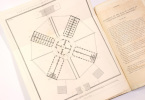


![[Prison, For-l'Évêque, Paris] Intéressante pétition des prisonniers de la « Bastille des comédiens ».. [Prison, For-l'Évêque, Paris] Intéressante ...](https://static.livre-rare-book.com/pictures/JNL/015169_1_thumb.jpg)
![[Prison, For-l'Évêque, Paris] Intéressante pétition des prisonniers de la « Bastille des comédiens ».. [Prison, For-l'Évêque, Paris] Intéressante ...](https://static.livre-rare-book.com/pictures/JNL/015169_2_thumb.jpg)


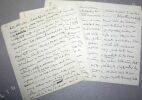

![Pièce signée. [Prison, Fontevraud] Feuille de sortie.](https://static.livre-rare-book.com/pictures/JNL/015170_thumb.jpg)
![Description d'un moulin de discipline appelé tread mill, inventé en Angleterre, par M. Cubitt, d'Ispwich, Comté de Suffolk.... [PRISON]](https://static.livre-rare-book.com/pictures/NIC/12781_1_thumb.jpg)
![Description d'un moulin de discipline appelé tread mill, inventé en Angleterre, par M. Cubitt, d'Ispwich, Comté de Suffolk.... [PRISON]](https://static.livre-rare-book.com/pictures/NIC/12781_2_thumb.jpg)
